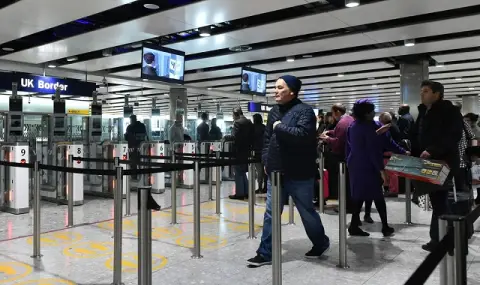Poland's Prime Minister Tusk not only wants to abolish the right to asylum, but also to limit labor migration. This creates serious problems for Polish enterprises, writes ARD and explains the reasons.
In the company "International Logistics Marathon” business is going very well in Poznań. 400 trucks travel across Europe, and next year their number is expected to increase by another hundred. But drivers are also needed for that.
Deputy director of the company's board, Alexandra Kashub, tells ARD that she expects the recruitment situation to become more and more complicated. The processes will become more complex because more documents will be required. And this could be fatal for the development of this company.
31% fewer visas
The reason Kashub is worried about the future of his business is Poland's new migration strategy. Prime Minister Donald Tusk presented it before October, ARD recalls. At the time, the main focus was on the announced temporary freeze on the right of migrants to seek asylum in Poland. The strategy is characterized by very strict measures on illegal migration. But this is only a small part of the plan, which, according to Tusk, should become an example for the entire European Union.
Rules for issuing student visas have also been tightened. The aim is to prevent this loophole from being used by immigrants who pretend to be studying at university but are actually working, the government explains. Access to the Polish labor market will actually be drastically changed and very strictly regulated. Only highly qualified workers or those who are citizens of countries that are part of the Organization for Economic Cooperation and Development or with which Poland or the EU have repatriation agreements are sought.
In the first half of this year, Tusk's government has already reduced the number of student and work visas issued by 31% compared to the previous year. This action is also in response to alleged illegal visa practices under the previous government.
Companies are having a hard time finding workers
Tusk is categorical about what his main goal is: "I would prefer labor migration to be at the level of skilled labor, not just cheap labor,”, he said. Little by little, entrepreneurs in Poland are beginning to realize what this means for them. In construction, catering and logistics, companies are usually looking for less skilled workers. Nearly a quarter of them come from countries outside the EU, writes ARD.
In the "International Logistics Marathon” these are half the workers - Ukrainians, Belarusians, Georgians - they take care of the prosperity of the company. The reason is that fewer and fewer Poles want to do manual work.
Dependent on foreign workers
The Polish labor market has a more serious shortage of personnel than at any time since the 1990s. this way. There is practically full employment. According to Eurostat, the unemployment rate is only 2.9%, making it the second lowest in the EU after the Czech Republic. In addition, as in many other European countries, a negative demographic trend is also observed. In 2023 the country registered a decline in the number of the population for the sixth year in a row. According to current forecasts, by 2035 Poland could lose two million workers.
For this reason, companies increasingly rely on labor from abroad. About 1.1 million foreigners currently work in Poland, which represents 6.7% of the country's total workforce, ARD explains. The majority of them are Ukrainians, followed by Belarusians - countries neighboring Poland, but in recent years there has been an increase in migration from distant countries such as Bangladesh or Nepal, Colombia or Zimbabwe. In some cases, the number of work permit applications has increased fivefold since 2022. until 2023
Just electioneering?
"Without the Nepali workers, I am lost,” says Robert Stankiewicz, owner of a bistro in Warsaw. He has been worried since he heard about the new migration strategy as five of his employees are from Nepal. Some of them studied in Poland and now work in Robert's kitchen. He pays them well and they are happy. But are they considered skilled workers?
Machei Vronski, chairman of the association of employers from the transport and logistics sector, is not satisfied with the government's plans. Because the needs of the economy have not been consulted in advance and because many things are still completely unclear. Above all, however, because he sees the document as pure pre-election campaigning.
Next year, Poland will elect a new president. The subject of labor migration is always a good way to scare people, Vronsky believes. Employers will suffer and potential new workers will be turned away. However, Vronsky did not think that the strategy would be implemented in the way it was presented. The government will always have to realize that this plan does not correspond to reality.
